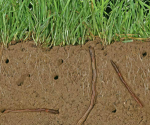We’ve heard of Whale sounds – but here’s a new addition to the sounds of Nature.
The University of Warwick is developing a method of finding out how many worms populate our soil by listening to their chatter – well – more a rasping, apparently!
The extract below – from ‘The Week’ magazine explains all…
Earthworms are vital to soil health: they help keep it nutritious, oxygenated and contaminant-free, so it is little wonder that farmers like to make sure their fields are teeming with them. The type of worm matters too. A field will ideally be home to three varieties: surface dwellers, horizontal burrowers and deep burrowers. But finding out how many of each are present isn’t easy: it involves digging up a sample of soil, extracting the worms and sending them to a lab for analysis. A better solution, say scientists at the University of Warwick’s Crop Centre, would be to listen to the sounds under the crops and identify the worms, and their number, by the “rasping and rhythmic scrunching” noises they make. The researchers have received £250,000 of government funding to do just that: they plan to develop a probe which, when put in the soil, would eavesdrop on the subterranean chatter and record it. The idea is that by training AI to analyse this “soundscape”, they will be able to give farmers a breakdown of the wormlife on their land within a few minutes. “Our basic hypothesis [is] that a noisy soil is a healthy soil,” said Andrew Baker, founder of acoustics experts Baker Consultants, which is partnering with the university on the project.

